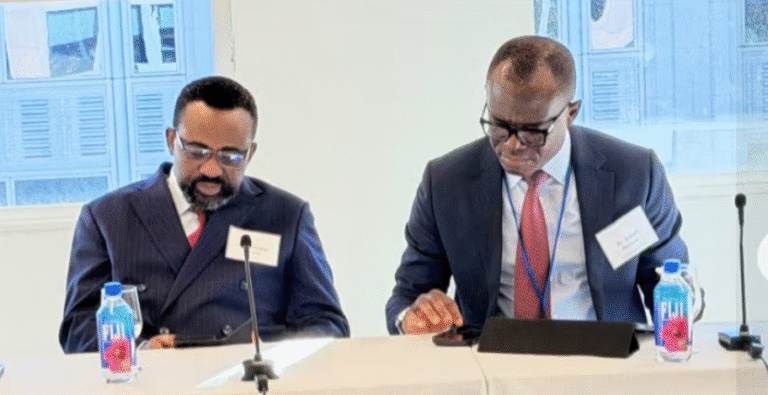Dr Asiama (Left)
The Governor of the Bank of Ghana (BoG), Dr Johnson Asiama, has said that the central bank continues to hold tight to its monetary policy stance despite the easing of measures to tame inflation.
Explaining what accounted for the drop in inflation since the new administration took over, Dr Asiama gave the credit to the tight monetary stance of the BoG.
“When we came in, we saw that we had to do a number of things; even the entire monetary policy framework needed to be upgraded, and we needed to strengthen the credibility of the central bank. There was a lot of liquidity that had built up, so we needed to do lots of sterilisation.
“We also needed the complementary efforts from the fiscal authorities, and so we had to engage the fiscal authorities at the same time. You also needed to look at food prices, so it was a complementary effort across all fronts that has helped to deliver the disinflation we are looking at.
“But we give a lot of credit to the tight monetary policy stance we had currently preserved, even though we are easing, we are still holding that anchor very strong, strong liquidity management, strong sterilisation. For that, we will not compromise even as we ease downward,” he said in an exclusive interview on the sidelines of the International Monetary Fund (IMF)/World Bank spring meetings in Washington.
Dr Johnson Asiama further stated that the Mahama administration has so far done a good job in restoring the economy, hence Ghana can exit the International Monetary Fund (IMF) programme next year.
He made the point that Ghana is currently ahead of most of the targets and benchmarks under the IMF programme.
“We are running ahead of programme target for the year on almost everything: inflation, reserves, build up economic growth, we are running ahead, and we are happy that we will be able to exit the programme next year, and so far so good, the first 8 months have been revealing, we think we have done a good job. We are getting all the upgrades from our rating agencies, which shows clearly that we are on the right path,” he said.
Dr Asiama further recounted that the Mahama administration inherited an economy that was facing severe challenges. He said inflation was high, the exchange rate was wide, and the economy had been downgraded by the rating agencies. But within 8 months into office, he said, they have turned the corner.
He said, “It has been 8 months since we came into office, and we came to meet a challenged economy. Remember, we had the domestic debt issue in 2022. Fiscal policy was highly expansionary, which led to our exiting the financial market.
“There was resort to domestic financing; you remember all the sovereign downgrades that we had to suffer. And so we came into office with lots of liquidity, high inflation, exchange rate that was depreciating widely.
“I remember when we came in, there was talk about whether we should cancel the programmes altogether, there was doubts as to whether we would be able to carry on with the programme and end it. But I am happy to say that 8 months down the road, we have turned the corner, Ghana is back, inflation we met it nearly 24 per cent, but currently it is down to 9.4%, we are seeing a strong rebound in growth.”
Dr Asiama further dismissed claims that the central bank is depleting the country’s foreign reserves through market interventions, saying that they are rather rebuilding its reserves, not burning them.
“Yes, there were allegations about whether we’re intervening in the market. But that was not exactly the case,” he said.
He explained that what appeared to be heavy central bank activity between the second and third quarters of 2025 was mainly due to “lumpy payments” that had to be cleared during that period.
“Between the second and the third quarter, we had to do a number of lumpy payments. There were all these large arrears in payments to some of the IPPs. These were billions of US dollars,” Dr Pandit explained.
Source:Lovinghananews.com


